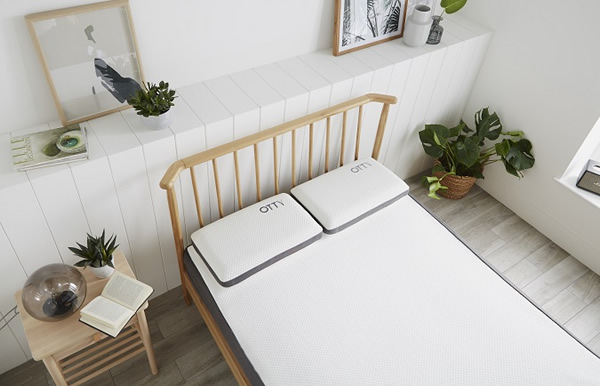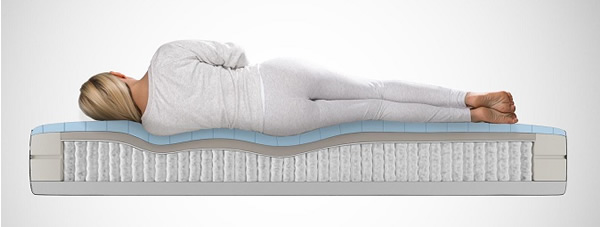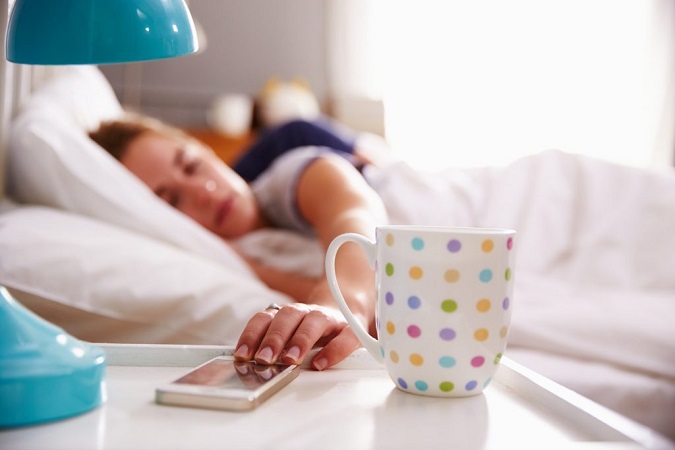Positive Health Online
Your Country

How to Get a Good Night’s Sleep
listed in sleep and insomnia, originally published in issue 249 - October 2018
The Dalai Lama once said, “sleep is the best meditation”, and with proven benefits on both physical and mental wellbeing, the importance of a solid night’s rest really is incomparable. However, with issues often stemming from a lack of product and medical knowledge and the growing impact of technology, how can you ensure you’re getting a solid seven to eight hours’ sleep per night?
Michal Szlas, CEO of bed-in-a-box retailer OTTY Sleep, discusses how to get the best rest, and offers tips on how to get the perfect night’s sleep.

It’s well reported that a healthy sleeping pattern will see the average adult sleep between seven to eight hours per night. We know there may be medical issues that could result in poor sleep hygiene, such as stress, sleep apnoea and insomnia, but not enough people know the health-threatening problems a lack of sleep can cause.
In an interview with The Independent in 2017, Professor Matthew Walker, director of the Centre for Human Sleep Science at the University of California, Berkeley, said the “catastrophic sleep-loss epidemic” is causing a host of potentially fatal diseases, including cancer, diabetes, heart disease and poor mental health.[1]
This is an issue particular prominent in the UK, as we’re continuing to see an increase in people suffering with a bad night’s sleep – as proven by a report released by the NHS in 2017. The report stated that the number of tests to diagnose sleeping disorders doubled from 69,919 in 2007-2008 to 147,610 in 2017.[2]
With this is mind, why aren’t we sleeping well, and what steps can we take to ensure we’re getting a good sleep night after night? In this article, I’ll discuss common sleeping habits and offer tips that will improve your sleep hygiene.
Regulating your Circadian Rhythm
Commonly known as the internal body clock, the circadian rhythm is the body’s natural regulator of sleeping patterns. Over a 24-hour period, the cycle occurs once, and it controls how much melatonin – a hormone discharged by the pineal gland in the brain that regulates sleeping patterns – is released into your body. The production of melatonin is influenced by the retina’s detection of light and dark.
In a regular cycle, melatonin levels will slowly rise in the evening, peak overnight during your sleep, before dropping again in the early morning, symbolising a standard sleeping pattern. However, an out-of-sync circadian rhythm can prove detrimental the body’s mental and physical wellbeing, potentially leading to a number of mood-affecting issues, as proven by the University of Glasgow.[3,4]
Published in The Lancet Psychiatry, the Glaswegian University looked at data collected from more than 90,000 UK-based people, and concluded that a disruption to the circadian rhythm can lead to an increased possibility of developing mood disorders, including depression and bipolar disorder, and lower levels of happiness.
Your circadian rhythm will run smoothly if you’ve got a good sleeping pattern, but if your brain has been deprived of sleep, you’ll feel the impact of fatigue during the day. It’s all down to a specific part of the brain known as the hypothalamus, which runs and improves your circadian rhythm.
However, luckily for us the body clock can be trained to help each of us sleep better and feel healthier. Simple tweaks such as adjusting your bed time by 15 minutes, waking up at a consistent time - even on days off - and resisting an afternoon nap will all improve and aid the circadian rhythm, and help you reap the benefits of a good night’s sleep.
How does Stress Interrupt Sleep?
A lack of sleep may not only prove problematic on the body, but can lead to an imbalance of hormones, especially cortisol - the stress hormone.
With elevated levels of cortisol causing a plethora of conditions such as insomnia, a way to stop reproducing the hormone is through a good night’s sleep, which is increasingly difficult if the “sleeper” is already experiencing heightened stress levels. According to research led by Oklahoma State University, one way to help combat increasing levels of stress is by sleeping on a new, comforting mattress.[4]
Conducted in 2009, the study saw 59 healthy adults (30 women and 29 men) sleep for 28 nights on their current worn mattress, before sleeping for the same amount of time on a new medium-firm mattress. The subjects were monitored throughout, with a huge focus on stress. Results proved that stress levels significantly decreased following the four week-long test, with participants feeling less worried, less nervous and less restless as result of a better sleep.

Correct Mattress for Specific Needs
In the past, people with back pain were very often recommended to sleep on a very firm mattress, but this isn’t correct according to Jeffrey N Katz MD Professor of Medicine and Orthopaedic surgery at Harvard Medical School, who claims changing your mattress can make a substantial difference.
He states, “In the past, doctors often recommended very firm mattresses. But in one study, in which 313 people slept on a medium-firm mattresses or firm mattress for three months, those with medium-firm mattresses reported less pain when lying in bed as well as less pain related disability compared with those using firm mattresses.”[5]
At OTTY, we regularly encounter customers who suffer from back issues such as sciatica and fibromyalgia. Backing up the quote by Jeffrey N Katz MD, the customers have commented that OTTY’s support and medium-firm firmness has helped to alleviate their symptoms, allowing them to get a good night’s sleep.
On a personal note, I’ve also noticed that there’s still a real lack of knowledge when it comes to selecting the correct mattress – an issue that is probably due in part to the lack of substantial medical research, combined with the mattress industry itself, which is now a confusing and convoluted minefield of inferior companies offering substandard products at a heightened price.
You have to sleep on the mattress for the next eight to ten years, so it shouldn’t be a decision to take lightly. If you are on the search for a mattress but are unsure which is the best for you, I recommend thoroughly researching the mattresses available. Many now offer 100 night trials, allowing you to test the mattress in the comfort of your own home for 100 nights. If after 100 nights the mattress still isn’t quite right for you, the company will offer you a full refund and arrange collection.

Blue Light Emission from Screens
The rise of technology has also begun to negatively effect sleep, due to the blue light wavelengths being emitted from electronic screens. Again linked to the circadian rhythm, blue light in the daylight can help us stay alert, improve mood and performance, and more importantly, inhibits the production of melatonin – the hormone that regulates sleeping patterns.
However for some, it’s second nature to have one last check of social media, their email inbox, or to simply watch one more episode of TV before they turn in for the night, not realizing that the blue light produced from the screen is stopping the production of melatonin, and will actually keep them awake for longer.
And while phones are offering a blue light filter as standard to help with the melatonin production, it’s still not as effective as turning the electronic screens off an hour or so before bed to help naturally creating melatonin, and in turn, providing a good and uninterrupted night’s sleep.
Can Exercise Disturb Sleep?
This really is a questionable topic within the industry, and the quick answer is that it all comes down to the person in question.
It may seem that exercise right before bed will ensure the body is fatigued and result in a better night’s sleep, but for those who already struggle to get a solid seven to eight hours, exercising close to bed time is likely to worsen the problem. While working out is often physically draining, it releases adrenaline, which increases blood flow to muscles and output of the heart, meaning you’re mentally revved up and can result in an inability to sleep.
However, while some believe exercising near bedtime can affect sleep quality for everyone, a study undertaken in 2013 by the National Sleep Foundation concluded that there were no major differences in the quality of the sleep for those who had performed “vigorous and/or moderate” exercises within four hours before bedtime.[6] Physical activity also helps to produce endorphins – a feel-good hormone that helps to relieve stress, and in turn, improves the ability to sleep.
Ultimately, there’s no bad time to exercise, so if the average person feels as though they’re benefitting from exercising at 6am or 10pm, they can continue with this in the knowledge that it’s unlikely to affect their sleeping patterns.
Effects of Sleeping on an Ageing Mattress
As an old mattress begins to wear out, it can start to sag in places or develop bumps and lumps, which reduces the level of support provided. This can lead to an awkward sleeping position, and results in pressure being applied to incorrect areas of the body. And as time goes on, the sleeper will begin to suffer from a host of pains and niggles – especially in the neck and back area.
And even if the old mattress looks good from the outside, the likelihood is that it’s not all right on the inside.
The average adult sheds a pound of skin per year and loses almost 300ml of moisture per night, with the mattress attaining most of this. The moisture makes the mattress the perfect breeding ground for bacteria and allergy-triggering dust mites.
While they are unlikely to cause life-threatening harm, they can lead to a number of illnesses ranging from skin infections to an exacerbation of asthma conditions, which will prove problematic for the 21m asthma and allergy sufferers currently residing in the UK.
The rise of the internet and the increase of online mattress retailers, such as OTTY Sleep, has made purchasing a mattress easier, and more cost effective, than ever before. Mattresses bought online often come with a ten-year guarantee, and a 100-night trial, allowing the sleeper to test the mattress before making the final decision.
However, despite the mattress purchasing process being easier and simpler than ever, there’s still a few out there who don’t fully understand the importance of a new mattress, and are unaware that making the switch could prove crucial in helping you in getting a good night sleep, while maintaining a healthier lifestyle.
References
2. https://www.bbc.co.uk/news/uk-england-40122979
3. https://www.huffingtonpost.com/2014/02/09/mattress-sleep-health_n_4740435.html
4. https://www.gla.ac.uk/news/headline_585356_en.html
5. https://blog.content.health.harvard.edu/blog/special-reports/low-back-pain-healing-your-aching-back/
6. https://articles.mercola.com/sites/articles/archive/2014/07/17/strenuous-exercise-night.aspx
Comments:
-
No Article Comments available